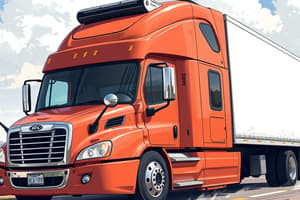Podcast
Questions and Answers
What is the lighting equipment required for second division or combination vehicles longer than 25 feet and/or wider than 80 inches?
What is the lighting equipment required for second division or combination vehicles longer than 25 feet and/or wider than 80 inches?
- One light must be on each upper-front corner (correct)
- Two yellow or amber lights on the front (correct)
- Three red lights on the rear in a horizontal line (correct)
- Two red reflectors on the rear of the vehicle (correct)
What is the maximum width for most vehicles?
What is the maximum width for most vehicles?
8 feet
What is the proper method for braking on long downhill grades?
What is the proper method for braking on long downhill grades?
Apply the brakes just hard enough to feel a slowdown and release when speed is roughly 5 mph below safe speed.
What are the laws that apply to one vehicle towing another?
What are the laws that apply to one vehicle towing another?
What are the maximum weights for single, tandem, and 5-axle combinations?
What are the maximum weights for single, tandem, and 5-axle combinations?
What is the maximum length allowed for second division vehicles, and what are the exceptions?
What is the maximum length allowed for second division vehicles, and what are the exceptions?
At what distance must warning flags, flares, or other approved warning devices be visible?
At what distance must warning flags, flares, or other approved warning devices be visible?
What are the requirements for reducing overweight on vehicles?
What are the requirements for reducing overweight on vehicles?
What types of vehicles are required to stop at railroad crossings?
What types of vehicles are required to stop at railroad crossings?
What is the maximum height, including load, for all vehicles?
What is the maximum height, including load, for all vehicles?
Flashcards
Vehicle length (max)
Vehicle length (max)
Most vehicles have a maximum length of 42 feet; exceptions exist for some objects.
Vehicle width (max)
Vehicle width (max)
Most vehicles, including second division, have a maximum width of 8 feet.
Vehicle height (max)
Vehicle height (max)
Height limitations include the load; specific maximum heights exist for all vehicles.
Lighting equipment for large vehicles
Lighting equipment for large vehicles
Signup and view all the flashcards
Towing Length
Towing Length
Signup and view all the flashcards
Towing safety equipment
Towing safety equipment
Signup and view all the flashcards
Towing passenger restrictions
Towing passenger restrictions
Signup and view all the flashcards
Single axle weight limit
Single axle weight limit
Signup and view all the flashcards
Tandem axle weight limit
Tandem axle weight limit
Signup and view all the flashcards
5-axle weight limit
5-axle weight limit
Signup and view all the flashcards
Braking Downhill
Braking Downhill
Signup and view all the flashcards
Warning devices visibility
Warning devices visibility
Signup and view all the flashcards
Overweight vehicle regulations
Overweight vehicle regulations
Signup and view all the flashcards
Railroad crossing stops
Railroad crossing stops
Signup and view all the flashcards
Drawbars
Drawbars
Signup and view all the flashcards
Extra Load on Vehicles
Extra Load on Vehicles
Signup and view all the flashcards
Objects length extension
Objects length extension
Signup and view all the flashcards
Railroad crossing stops
Railroad crossing stops
Signup and view all the flashcards
Study Notes
Lighting Equipment for Vehicles
- Required for second division or combination vehicles longer than 25 feet or wider than 80 inches.
- Front: Two yellow or amber lights at upper-front corners, visible from 500 feet.
- Rear: Three red lights in horizontal line, visible from 500 feet; two red reflectors at lower corners, one within 12 inches from each corner.
Maximum Vehicle Width
- Most vehicles, including second division vehicles, have a maximum width of 8 feet.
Braking on Long Downhill Grades
- Apply brakes to achieve a noticeable slowdown.
- Release brakes when speed is approximately 5 mph below the safe speed.
- Brake application duration should be about 3 seconds; repeat as needed when speed increases.
Towing Laws
- Drawbars must be strong enough for the towed weight; maximum length between vehicles is 15 feet.
- Safety chains or cables required to prevent separation; must be strong enough to support the towed vehicle.
- Passengers prohibited in towed vehicles unless specific exceptions apply.
Weight Limits
- Single axle: maximum 20,000 pounds.
- Tandem axle: maximum 34,000 pounds.
- 5-axle combinations: up to 80,000 pounds, depending on axle spacing.
Vehicle Length Restrictions
- Maximum length for most vehicles is 42 feet, regardless of load, with exceptions for certain structural objects.
- Objects such as pipes or poles can extend up to 80 feet under specific conditions.
Warning Devices Visibility
- Vehicles must carry warning devices (flares, lanterns, or reflectors) that are visible for 500 feet at night.
Overweight Vehicle Regulations
- Vehicles must stop to remove or shift excess load to comply with weight laws.
- Owners or drivers held responsible for unloaded materials; potential arrests for overweight violations.
- Tolerance for arrests based on weight over limits; reduced for vehicles exceeding 80,000 pounds.
Railroad Crossing Stops
- Specific vehicles (passenger-carrying second division vehicles, certain buses, and those carrying hazardous materials) must stop at all railroad crossings.
- Required to stop within 50 feet, but no less than 15 feet from the nearest rail.
- Drivers must listen and look for trains before proceeding.
Maximum Vehicle Height
- Height restrictions include the load; specific maximum height values are set for all vehicles.
Studying That Suits You
Use AI to generate personalized quizzes and flashcards to suit your learning preferences.




